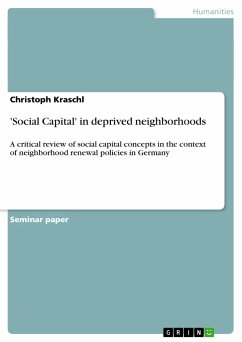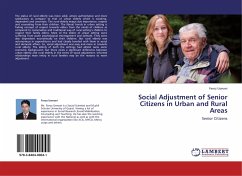
'Social Capital' in deprived neighborhoods
A critical review of social capital concepts in the context of neighborhood renewal policies in Germany

PAYBACK Punkte
0 °P sammeln!
Seminar paper from the year 2008 in the subject Sociology - Social System, Social Structure, Class, Social Stratification, grade: 8.5 (excellent), University of Amsterdam (International School of Humanities and Social Sciences), course: Social Problems in Urban Areas: Views, Concepts, Theories , language: English, abstract: In this article concepts of social capital in the context of social policies are discussed which focus on neighborhood renewal. First, theories of social capital are illuminated by comparing the concepts of Putnam, Bourdieu and Granovetter. Second, by the example of the Ger...
Seminar paper from the year 2008 in the subject Sociology - Social System, Social Structure, Class, Social Stratification, grade: 8.5 (excellent), University of Amsterdam (International School of Humanities and Social Sciences), course: Social Problems in Urban Areas: Views, Concepts, Theories , language: English, abstract: In this article concepts of social capital in the context of social policies are discussed which focus on neighborhood renewal. First, theories of social capital are illuminated by comparing the concepts of Putnam, Bourdieu and Granovetter. Second, by the example of the German program "Socially Integrative City" (SIC), a recent nationwide strategy (aimed at revitalizing deprived neighborhoods) is analyzed. Which of the aforementioned concepts of social capital (or concept-elements) are implemented in the SIC-initiative? For answering this question key documents that outline the aforementioned policies are reviewed. Policies and objectives of the SIC-initiative which can be related to the three depicted approaches to social capital are identified. In the framework of this analysis there is particular consideration of the 'sub-concepts' of social capital: bonding, bridging and linking. With this the author reveals which kinds of social relationships between people and different population-groups are planned to be established. In this context the function of social capital is particularly considered. Finally, after the discussion of recent critiques on social capital theories, these are evaluated with regard to their usefulness for social policies in deprived urban areas.













